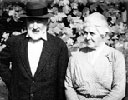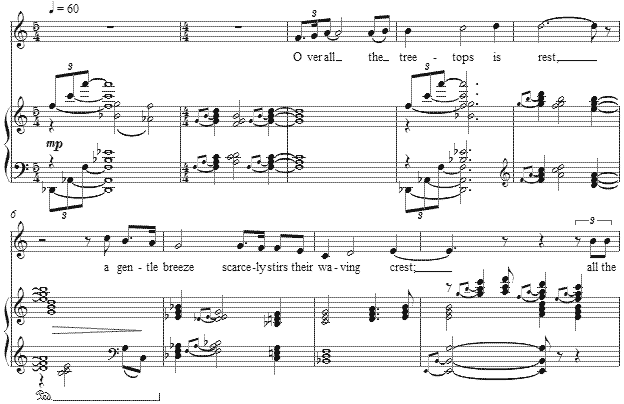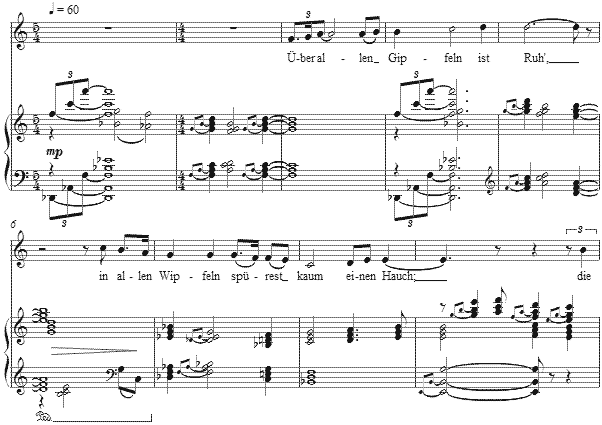Music and Texts of GARY BACHLUND
Vocal Music | Piano | Organ | Chamber Music | Orchestral | Articles and Commentary | Poems and Stories | Miscellany | FAQs
My Heart, Waiting - (2009)
Harmony Twitchell
for medium voice and piano
Over all the treetops
is rest,
A gentle breeze
scarcely stirs their waving crest;
All the birds are silent
each in his quiet nest.
So my heart, waiting,
soon will rest.
[ 1 page, circa 1' 15" ]
Charles and Harmony Twitchell Ives
Harmony Twitchell Ives (1876-1979) was of course wife to the American composer, Charles Ives. Daughter to Reverend Joseph Twitchell, she attended her father's church which luminaries of that time such as Charles Dudley Warner, Harriet Beecher Stowe, and close friend Mark Twain also attended. Harmony Twitchell in fact considered Mark Twain as "Uncle Mark." She had been a registered nurse, and it was at the Center Church in New Haven that Charles Ives served as organist. It is said that her brother, David who was a friend of Ives, would nudge her during services to alert her to the deviations from the standard harmonies which were published in the hymnbook of that time. The Ives' courtship was very formal and lasted over three years, being wed in 1908.
This lovely, loose translation of Johann Wolfgang Goethe's "Wandrers Nachtlied" was made in 1907, prior to her marriage to Ives. The setting by Ives is published in his collected and self-published 114 Songs (1922) titled as "Ilmenau" [ 1 ] with both the German and English texts printed together under the vocal line. [ 2 ] From the title as given by Twitchell, one sees her awareness of Goethe's having written this of the city and its surroundings.
In considering setting this text, I began with Twitchell's English interpretation, and after completing the setting did I revise only slightly the vocal line to reflect the German original, which is also made available below. The setting refers with regularity to a polytonal and widely spaced lowered supertonic symbolizing that pressure of life which becomes relieved and released as it presses down to the tonic of C major. The remaining polytonal chords which accompany the vocal line surround the tonic as well.
As with the setting by Ives, Twitchell's text fits rather nicely to the same gestures as does the German text. Ive's setting repeats phrases, while this setting is through-composed. Thus the setting with Goethe's text is quite equivalent with the interpretation of it in English by Twitchell.
The score for My Heart, Waiting and the German setting by Goethe, Ruhest du auch, are available as free PDF downloads, though any major commercial performance or recording of the works are prohibited without prior arrangement with the composer. Click on the graphic below for these piano-vocal scores.
NOTES
[ 1 ] Ilmenau is a town in the German state of Thuringen, the name coming from "Ulmen" for elms and "Aue" which identifies the flood plain of the Ilm river. Founded in the 13th century, its connection with Goethe (1876-1979) and his writing a portion of his Lyriche Dicthungen (Weimar, 1775-1786) in a visit to the area is documented in his letters from 1776 through 1780 which describe some of his visits. Of the restful stays he had in Ilmenau Goethe wrote this particular poem, on 6 September 1780. The text in German is:
Über allen Gipfeln
Ist Ruh,
In allen Wipflen
Spürest du
Kaum einen Hauch;
Die Vögelein schweigen im Walde.
Warte, nur balde
Ruhest du auch.
[ 2 ] The Ives 1922 edition of 114 Songs places his setting of the two texts as number 68, on page 153. The text is attributed simply to "Goethe" and then beneath the translation is noted as by "H. T. I."
Of the Ives' relationship, Stuart Feder writes, "For Harmony, if her husband were not quite -- or not yet -- a great man, she would do everything in her power to make him one. She was well acquainted with his vulnerability and, further, knew that his need for her to see him as a great composer was intense. Her mother's prediction proved at length to be correct; there would be much to bear in the forty-five years she and Charlie were married, and her love for him would make it bearable. At this point, they turned toward each other the more. And although a few years later, they would adopt a child whom they both adored, in ministering to the trials and multiple illnesses of her husband, Harmony would at length find her child in Ives." p. 114, The Life of Charles Ives, Stuart Feder, Cambridge University Press, 1999.


